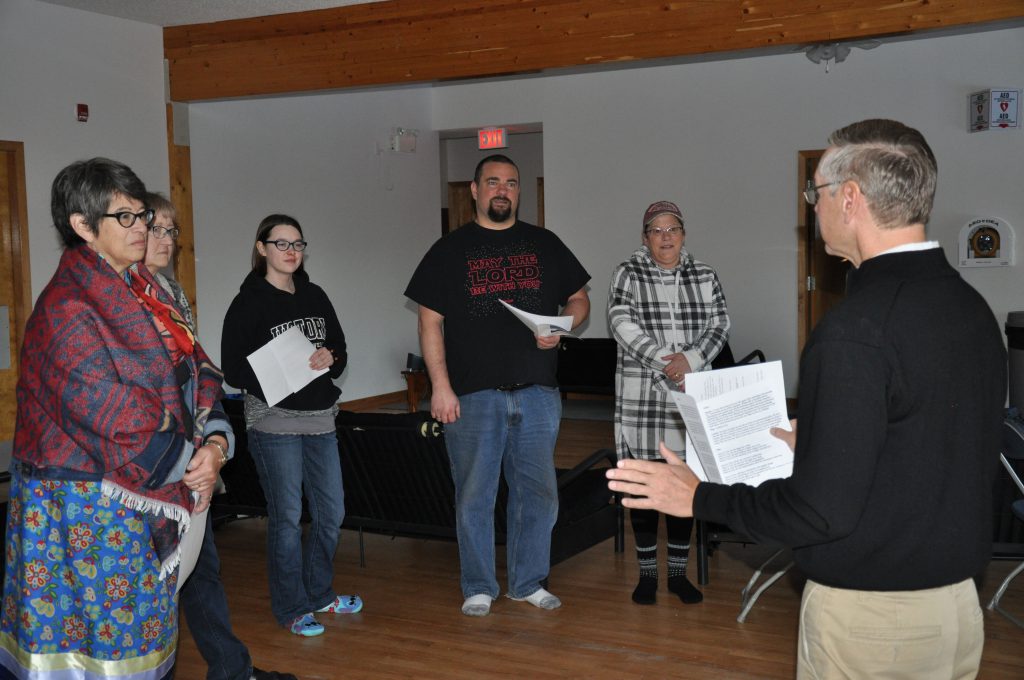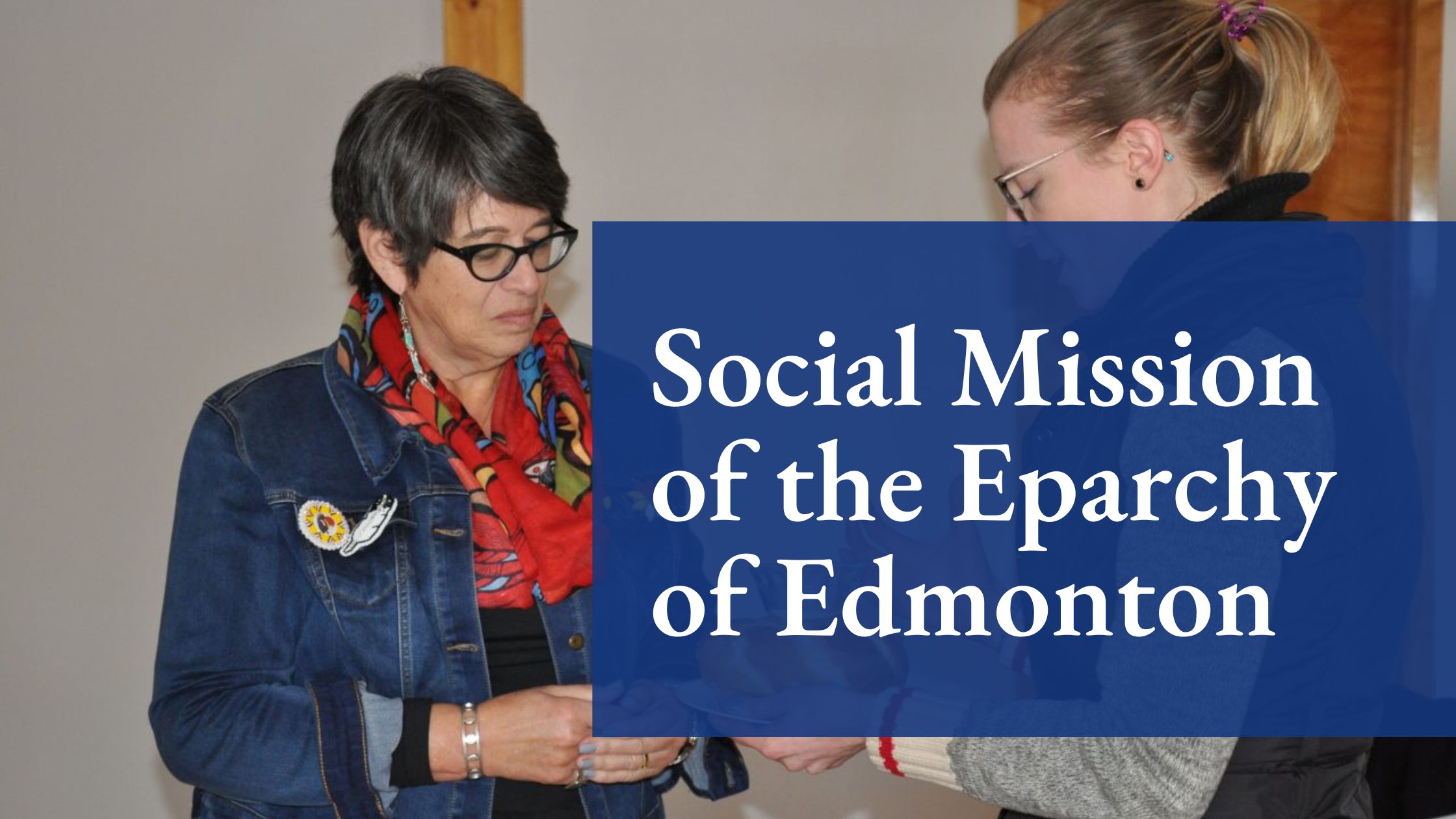Excerpt written by the Social Mission Commission of the Eparchy of Edmonton.
For those new to Ukrainian Catholicism, it is essential to understand that the church’s social mission is a cornerstone of its beliefs and practices. The Ukrainian Catholic Church strives to create a world that is guided by peace, justice, and solidarity. This social mission is intricately tied to the church’s teachings and is lived out through its actions and engagement with communities.
The social mission of the Ukrainian Catholic Church is grounded in the belief that all people are created in the image of God and, as such, possess inherent value and dignity. The church’s teachings emphasize the importance of recognizing and uplifting the intrinsic worth of every person, regardless of their background or circumstances. This principle forms the foundation of the church’s social mission, and it informs all of its teachings and practices.
The Ukrainian Catholic Church’s social teachings also promote the importance of the common good. This principle acknowledges that the well-being of individuals and society as a whole is interconnected. Therefore, the church seeks to create communities that are based on principles of mutual care and support. This principle is lived out through the church’s work in the community, where it seeks to build solidarity and strive towards solutions to difficult social problems.
The concept of solidarity is crucial to the Ukrainian Catholic Church’s social mission. Solidarity involves a deep sense of connectedness and interdependence with others. This principle is at the heart of the church’s belief in creating a world that is characterized by justice and peace. By being in solidarity with one another, the church is better equipped to address the challenges that face society, such as poverty, injustice, and inequality.
Another essential aspect of the Ukrainian Catholic Church’s social mission is the concept of subsidiarity. This principle asserts that decisions should be made at the local level wherever possible, enabling people to take ownership of their communities and engage with others in making decisions. This principle provides a framework for active engagement with society by encouraging individuals to take responsibility for the betterment of their communities.
The Ukrainian Catholic Church strives to live out its social mission by actively engaging with the community, building relationships, and advocating for justice and peace. Through programs, initiatives, and partnerships, the church provides education, support, and resources to empower individuals to become active participants in their communities. Additionally, the church seeks to provide avenues for spiritual growth and development, nurturing a sense of hope and encouragement in individuals and communities.
In conclusion, the Ukrainian Catholic Church’s social mission embodies its commitment to creating a world that is guided by peace, justice, and solidarity. Its teachings emphasize the intrinsic value of every person, the importance of the common good, and the power of collaboration and subsidiarity. Through its active engagement with society and partnerships with individuals and organizations, the Ukrainian Catholic Church seeks to empower and support social action and create meaningful change in the world. For those new to Ukrainian Catholicism, embracing the church’s social mission offers an opportunity to become part of a community that is committed to creating a better future for all.

As a precious gift from God we want to take good care of it. A submitted poster for a children’s poster contest.
3 Ways to Live the Social Mission of the Ukrainian Catholic Church
If you want to make a difference in the world, there’s no better place to start than by living the social mission of the Ukrainian Catholic Church. From promoting peace to caring for all of humanity and creation, this spiritual call-to-action offers a path to a better tomorrow. Here are three life-changing ways you can get started today.
1. Promote Peace: Love in Action
The path to peace starts with a single step. Whether you’re lobbying your government against human injustices or examining your own words and actions for signs of division, every act of love in action counts. Want to do more? Explore programs that promote peace – you’re sure to find something that resonates with you. Learn about programs that promote peace.
2. Care for All of Humanity: Join the Movement
With so many challenges facing humanity, it’s hard to know where to start. But the Ukrainian Catholic Church has a clear mandate: care for all of humanity. From supporting fair trade to respecting the sanctity of all life, there are endless opportunities to make a difference. Want to get involved? Get to know your neighbours, educate yourself about issues that matter, and take action through solidarity and love. Take part in the March for Life. Subscribe to the Euthanasia Prevention Coalition Newsletter.
3. Care for Creation: Make a Difference
We all have a role to play in caring for the environment and everything in it. Whether you start small with reusable products or tackle bigger changes like investing in cleaner energy or reading Pope Francis’ world-changing encyclical on care for creation, every action you take matters. So why not make a difference today? Your planet – and future generations – will thank you. Read Laudato Si (Pope Francis/ encyclical) to learn more about Care for Creation and how to put it into action.
Start your journey towards a brighter tomorrow by living the social mission of the Ukrainian Catholic Church – and discover the joy of making a difference in the world.

Indigenous Social Mission Retreat: Engaging in Dialogue in the Eparchy of Edmonton.
The Believer’s Social Directives
Adopted by the Third Session of the Patriarchal Sobor of the Ukrainian Greek Catholic Church that took place in Lviv on June 28 – July 5, 2002 and confirmed by the Synod of Bishops of the Ukrainian Greek-Catholic Church on July 15, 2002 in Kyiv.
Being baptized in the name of the Most Holy Trinity, having the example of the saints, confessors and martyrs, remaining under the heavenly intercession of the most holy Mother of God, as a believer of the Ukrainian Greek-Catholic Church, I adhere to the following principles:
1. I live by faith in Jesus Christ according to the teaching of the Church. I help society through my personal life according to God’s grace. I respect the image of God in every human being. I avoid superstitions and fortune-telling.
2. I respect my body as a temple of the Holy Spirit, and do not defile it with alcohol, tobacco, narcotics, or sexual promiscuity. I oppose these with the wisdom and power of the Gospel and with Christian morality. I seek to influence the mass media that they may reflect Christian culture.
3. I show my allegiance to Jesus Christ. I embody my faith in my daily work and everyday life. I participate in the Divine Liturgy and cleanse my soul through the Mystery of Repentance.
4. I perform my duties conscientiously. I make every effort to overcome discord, malice, and hatred among people. I teach myself to value social unity through participation in community and political life.
5. I thank God for the gift of life. I defend human life from conception to natural death. I help the sick, the vulnerable, and those deprived of rights.
6. I preserve chastity in both married and celibate life. I cultivate marital love and strengthen the family through common prayer and mutual respect and care. I maintain marital fidelity. I teach children and youth through my personal Christian example. I help them resist temptation.
7. I practice selflessness. I do not covet the shared or personal goods of my neighbours be they material, spiritual or intellectual. I will do everything possible to prevent my taking or giving bribes.
8. I seek truth and just laws. I respect the right of others in their quest for goodness and truth. I oppose all forms of violence.
9. I respect the natural riches of the earth as God’s gift, and use them prudently.
10. I live in the hope given to me by God. I bear trials courageously and patiently. Through my good deeds, I strive to bring about the kingdom of God.

